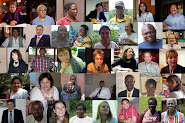
In November and December of 2006, CCL sent a team of five to Uganda and Kenya to conduct interviews, prototype new leadership development models and test preliminary concepts that were aligned with the design considerations guiding an initiative entitled, Global Voice of Leadership (GVOL). A second visit took place in July 2007. Our initial work was to translate the Center for Creative Leadership's content and knowledge base into meaningful tools for leaders working in a diverse African context. The team used story-based interviews to hear from local NGOs, CBOs, and FBOs how work was accomplished at its best and what the challenges organizations, teams, and individuals faced day-to-day. Our team developed what we now call a CCL "Leadership Essentials" workshop.
Workshops were hosted in Jinja (Uganda), Nakuru (Kenya), and Nairobi (Kenya) with groups of 20 to 40 participants attending each workshop. Experiential exercises were tailored to the language and context of East Africa. Hand-score assessments were chosen to provide participants with information about their personality styles when approaching change. CCL feedback models (Situation-Behavior-Impact) and leadership models (Direction-Alignment-Commitment) as well as our approach to development (Assessment-Challenge-Support) were utilized and tested at each of these workshops. The workshop was led by one trainer with no power-point screen shows, limited handouts, and no assessment pre-work. While CCL typically delivers a high-tech, five-day program, the CCL team delivered a high-touch, one-day workshop with similar impact.
One participant shared the following comment at the conclusion of our first workshop in Uganda.
“This training is very important and you need to understand why we say to you, you need to come back. You hear us saying come back soon and it is for a reason. Where you come from this leadership teaching may result in better management, better business practices. But here, here in Uganda this teaching has the ability to save lives. This region, these governments have been at war for many years. If they heard today what you were teaching us I believe we could end many of these conflicts. We could see an end to these wars.”
In July 2007, CCL returned to East Africa to train a group of 50 NGO partners for CHF International and to assist ERMIS Africa with the launch of the Eastern Africa Leadership Forum. CCL returned to East Africa at the request of these NGOs who provided a small amount of seed money to partially offset the expenses of the CCL team.
We invited
LEAP Africa to co-train these workshops with us and they accepted the invitation. We want to explore a formal affiliated partnership with LEAP through which they may continue delivering CCL content and materials for a royalty fee. In July, we worked with a LEAP trainer and with very limited ramp-up in order to test the “Grassroots trainer kit” providing the appropriate materials and instructions for the delivery and facilitation of CCL workshop modules. This concept test was tested with the safety net of having CCL there to support the work. Based on our 2007 experience in East Africa we believe that it will be possible to create a training of trainers workshop through which we will can increase the training capacity of multiple organizations and extend the reach of our program content and materials.
The Eastern Africa Leadership Forum is a non-profit entity stemming from a synergistic joint initiative between CCL and Environmental Research, Mapping and Information Systems in Africa [
ERMIS Africa] that focuses on promoting leadership and leadership development within the region. It draws from shared principles and experiences by the two organizations on the need to create partnerships, networks, and communication mechanisms towards development of leadership skills and resources. The forum envisions individuals and organizations within the Eastern Africa region applying creative leadership tools to solve complex leadership challenges towards sustained development within the region. The mission of the Forum is to advance the understanding, practice and development of good leadership practice for the benefit of society within the Eastern Africa region. This concept came about as a direct result of requests from the participants of the leadership workshop hosted in Nakuru, Kenya in 2006. The 2006 work included participants from diverse backgrounds representing NGOs (n=10), government offices (n=4), educational organizations (n=5), and businesses (n=6).
We are actively seeking opportunities to extend these initial field tests to further illustrate how the Center for Creative Leadership can create and sustain viable models and tools to bring affordable and accessible leadership development and organizational capacity to base of the pyramid economies. Please comment on this blog entry if you have creative ideas or suggestions for how we can extend this work further.
 CCL’s Jeffrey Yip recently interviewed Sam Voorhies of World Vision for an upcoming issue of the Leadership in Action journal. Sam spoke about the role leadership development has to play in accomplishing the organization's mission.
CCL’s Jeffrey Yip recently interviewed Sam Voorhies of World Vision for an upcoming issue of the Leadership in Action journal. Sam spoke about the role leadership development has to play in accomplishing the organization's mission.





























